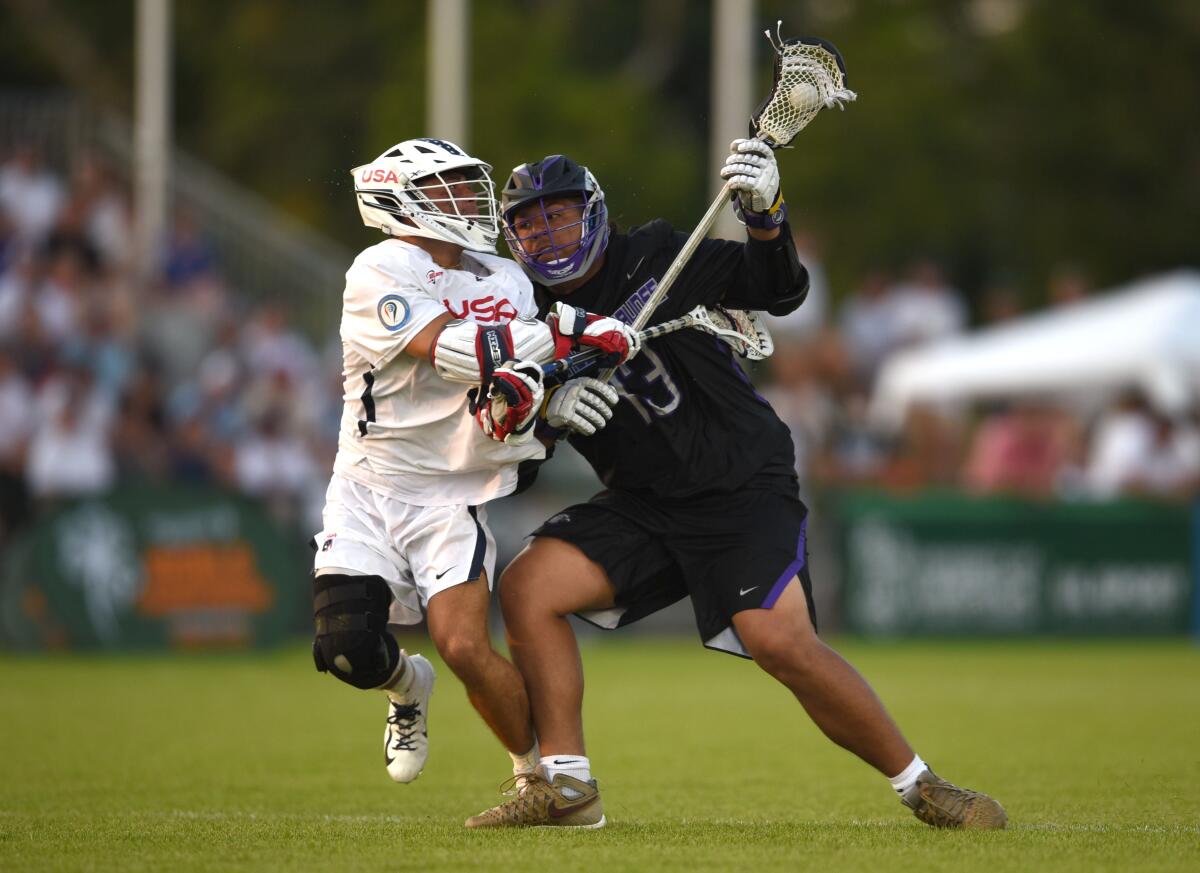A Native American lacrosse team in the 2028 L.A. Olympics? It’s possible — but it won’t be easy

- Share via
It isn’t hard to make an argument for letting the Haudenosaunee Nationals lacrosse team compete at the 2028 Summer Olympics in Los Angeles.
The collection of elite Native American players, recruited from across the Northeast, belong to a people who invented the sport centuries ago. Playing under their own flag at last summer’s World Lacrosse Championship, they beat out a slew of nations to finish third behind the U.S. and Canada.
Now, with their game added to the Olympic program for 2028, President Biden has called upon sports officials to make room for the Haudenosaunee among the usual gathering of nations.
“They perfected [lacrosse] for millennia,” he said. “Their circumstances are unique.”
But this laudable idea faces some very real challenges, bumping up against a tangle of Olympic regulations.
The Haudenosaunee Confederacy, composed of U.S and Canadian communities, first played lacrosse on wide-open stretches of land, using sticks fashioned from hickory and catgut. They have always viewed the game as a gift from their creator and approach it with joyfulness. This attitude helped during hard years as the team struggled for a place in the modern sport, which has come to be dominated by elite universities and upscale high schools.
Native Americans invented lacrosse but struggle for recognition from international organizers of the sport now played worldwide.
International tournaments refused them entry because the confederacy was not recognized as a sovereign nation. Opposing players chided them with racist taunts.
Winning at recent world championships was crucial, as was earning respect on and off the field from much of the lacrosse community. The Olympic Games represents something even bigger.
“This marks a positive step forward in the ongoing journey,” veteran player Randy Staats said, “toward a more inclusive and respectful world of sports.”
To understand the hurdles they face, think of the International Olympic Committee as a corporation intent on protecting a big money-maker. Like Oreos or Kleenex. The Swiss-based organization strictly regulates nearly every aspect of its Games.
Here’s where things get tricky.
The 109-page Olympic Charter states that, to participate, athletes must be part of a team submitted by their National Olympic Committee. And that NOC must represent “an independent state recognized by the international community.”
There is also a requirement that each NOC represents competitors in five sports.
Haudenosaunee athletes can try out for the U.S. or Canadian teams, depending on where they hold citizenship, but at issue is whether their confederacy meets the Olympic Charter standards for fielding a squad of their own.
The IOC doesn’t seem to think so. In a statement to The Times, the organization said “it is up to the two NOCs concerned [USA and Canada] ... to decide if they include athletes from Haudenosaunee in their respective teams.”
The Olympic Charter does allow for some exceptions, which the IOC employed to create a refugee team for athletes forced to flee their native countries as a result of conflict or natural disaster. But officials’ reluctance to apply that process to the Haudenosaunee suggests they are concerned about the precedent it might set.
The team’s inclusion could encourage a long list of unrecognized countries around the world to apply for Olympic entry. Scottish curlers, whose homeland is credited with inventing that sport, could make an argument for competing under their own flag instead of being part of the British team.
On Thursday, U.S. Olympic & Paralympic Committee chief executive Sarah Hirshland spoke about wanting to “honor the Haudenosaunee Confederacy and their history and legacy” but stopped short of saying the team should be allowed to compete.
Any such decision might have to wait until 2025 and the establishment of Olympic qualification standards for lacrosse.
None of this has deterred the Haudenousaunees’ growing number of backers.
In a joint statement, the team and World Lacrosse, which governs the sport, expressed “sincere gratitude” for Biden’s comments. Olympic organizers in Los Angeles also pledged their support.
“Rarely does an organizing committee have the opportunity to include a sport in its program that has such an important history as lacrosse does with the Indigenous peoples of North America,” LA28 said in a statement, adding that it will work to “find a solution that honors the sport’s heritage and allows participation for Haudenosaunee lacrosse athletes.”
More to Read
Go beyond the scoreboard
Get the latest on L.A.'s teams in the daily Sports Report newsletter.
You may occasionally receive promotional content from the Los Angeles Times.







